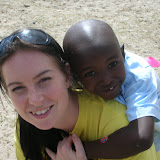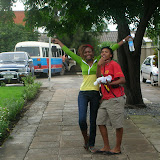I decided it was time to share another side of South Africa. Till now, most of my stories have been of my enjoyable, optimistic experiences. I often see sadness and desperation, but then find it hard to recount it through writing. However this is the bigger part of life for many people here. So I believe it’s important to share it.
Background: The Townships
(as a disclaimer, I just want to say I really don’t know a lot about the History of SA. This is what I’ve gathered through conversation and a lot may be fairly subjective. Please feel free to comment or correct me if you see obvious errors! )
I suppose I really should explain what the townships are like. In other countries, like Zambia, they are called “compounds”. Here they are the areas where either the ‘blacks’ or the ‘coloureds’ live rather exclusively. Please not that the term ‘coloured’ is not offensive in SA and refers to either a lighter-skinned black person or a person of mixed ethnicity. During Apartheid (60’s and 70’s up until a mere 15 years ago), those residing in the townships could not leave without a pass. A pass was given for work which for men usually meant mining, for women, housekeeping. Work within the townships was possible, for example as a street vendor, but there wasn’t much option (still isn’t - unemployment in townships generally stands around 65-75%). Once the “walls of apartheid” came down” inhabitants could leave the townships freely but there was no proper transition for these millions of people into the change that had occured in the cities during all those years of segregation. Is it any wonder they couldn’t didn’t have the skills or the knowledge to that would lead to success in this new world?
Let me take a step back and describe the living conditions in a township. It consists of thousands of houses packed into incredibly close proximity. The houses are usually either tiny concrete buildings or “shacks”: houses with walls of scrap metal, wood or poster board and usually a roof of sheet metal on top. Some have running water, some use the communal toilets and taps scattered every so often within their section. There are often intricate systems of spliced wiring in place; electric cables of multiple colours sweeping overhead on different streets like a ticker tape parade. The wires are kept high by long tree branches. I asked a co-worker if the government has come along and tried to take it down. He said they don’t bother because they know “one day they take down the wires, the next day, they will be up again.”
If you drive out of Cape Town, the townships begin just outside what I suppose are the city limits; like a desolate suburbia that stretches on for miles. Children play soccer on every inch of space available. Up close, it looks like a happy, though impoverished, place. People laughing, dancing and hugging, goats wandering through the streets, music blaring from God knows where. But when you take a step back and look at the enormity of this third world, it can become overwhelming, depressing, infuriating, incapacitating… and ultimately, completely embarrassing that we as humans have allowed this to happen.
The Townships and me.
As you probably know, I’ve been the only intern in Cape Town up until recently. I never had the comfort of being in a group. This site also lacks much of the infrastructure the other sites already have.
Like a car.
This means I usually can’t be in the townships to ensure the program that is already in place, is being carried out correctly or at all. I should be in the townships of Khayelitsha and Philippi often, meeting at least once a week with our trainers, going to the schools to observe what is happening, looking for new schools to run our program in the new school year and figuring out the logistics of setting up a street league. (This is the bulk of the job for the interns in the other South African sites). Even with a car, this would all take place with the accompaniment of my trainers who live in Khayelitsha.
My First Trip
Back in October, I was completely frustrated at working in the office and I decided I would take a chance and get myself out to Khayelitsha with my co-worker, Lubabalo (Babs). We had scheduled a meeting with our trainers (some of whom I hadn’t even had the chance to meet). We went to the main station in Cape Town, got into a minibus and started off along the highway, to his home.
We chatted through most of the trip (about 30 mins when the traffic is good) but were interrupted about halfway along when we saw a fire blazing out of control along the other side of the highway. Two shacks were burning wildly and I could see the residents huddled up on a hill, watching everything they had in the world, disappear. I thought about this situation in North America: a fire devastates a family which loses a lifetime of photos, souvenirs amongst other things. But they have insurance, savings, and family or friends who can actually afford to help us out a little when disaster strikes. I asked Babs what would happen to the family we were looking at on the hill. He told me they would live with friends and neighbours and a meal for one would become a meal for two until they got back on their feet. “They will probably stay with relatives – that’s what I did.”
I furrowed my brow as I imagine I often do – it’s hard to understand the quick, muffled English of a Xhosa speaker. It was true – Babs’ own shack had burned down in June 2006. He was still living on his sister’s property.
When we arrived I saw that Babs (or someone) had constructed a meagre dwelling out of mostly scrap metal. He had water and electricity and it was even divided into 2 rooms, a bedroom and a kitchen/everything else room. His sister had a concrete home next door. Babs said after his home burned down he only had the clothes on his back. The non-profit organization he had been working for 2-3 years, could only give him 150 rand (about $20) and a couple of t-shirts. He stayed with his girlfriend and I could see now that he’s nearing 30, he wishes he had more to give her… and more to show for himself.
Khayelitsha
Obviously Babs’ house didn’t provide a formal setting for our meeting (we sat on milk crates in a small room that doubled as a kitchen and living room) but it was productive nonetheless. It was great to finally see all of the trainers together! The usually couldn’t afford the $.75 ride into the city). They were all happy that I had successfully made it with no incidents!
Afterward Babs escorted me to the minibus stop. He actually came with me all the way through my transfer to ensure I got on the correct bus safely. Babs informed me that the bus ‘station’ (really just a mess of busses surrounded by food stalls) was the most dangerous place in Khayelitsha. It was still light and to be honest I didn’t feel that uncomfortable. Although I must say, Babs was constantly looking around and seemed pretty nervous.
Anyway, on that day, if you look at “the facts”, nothing happened. I didn’t even feel that scared. But, as many people have confirmed for me, there is always someone watching your every move, wondering what you’re carrying in your bag or what’s in your pocket. If there is an ‘incident’ it is usually opportunistic crime. Meaning, the perpetrator isn’t our usual definition of a ‘bad’ person waiting on the street corner looking for someone to score from. It may be their first crime. Desperation can make people do impulsive things.
Why I went back to this story …
I originally wrote this entry shortly after that trip and always meant to go back, read it with fresh eyes and ensure I was painting the proper picture. I got busy, had more exciting and positive experiences to log in, and so I basically let it sit. Recently, I was mugged for first time outside our offices downtown. The guy only got a phone I had borrowed from Ryan and I wasn’t hurt. But it shook me up a lot. Suffice it to say that the incident has changed me and certainly changed the feel of my experience here. Crime is a part of life in South Africa. One I was really hoping I wouldn’t be involved in, but just like HIV, when it affects one it affects us all. I’m hoping to use this as a chance to renew my faith in the work I’m doing, turn a negative situation into something positive. But it’s hard and until I really figure out how I feel, writing is the best I can do.
The one thing I ask is that you take a minute to be grateful for something those of you in North America probably have more of than you realize: safety and security. It’s certainly something I didn’t give too much thought too previously, but something I hope never to take for granted again.
Subscribe to:
Post Comments (Atom)






No comments:
Post a Comment